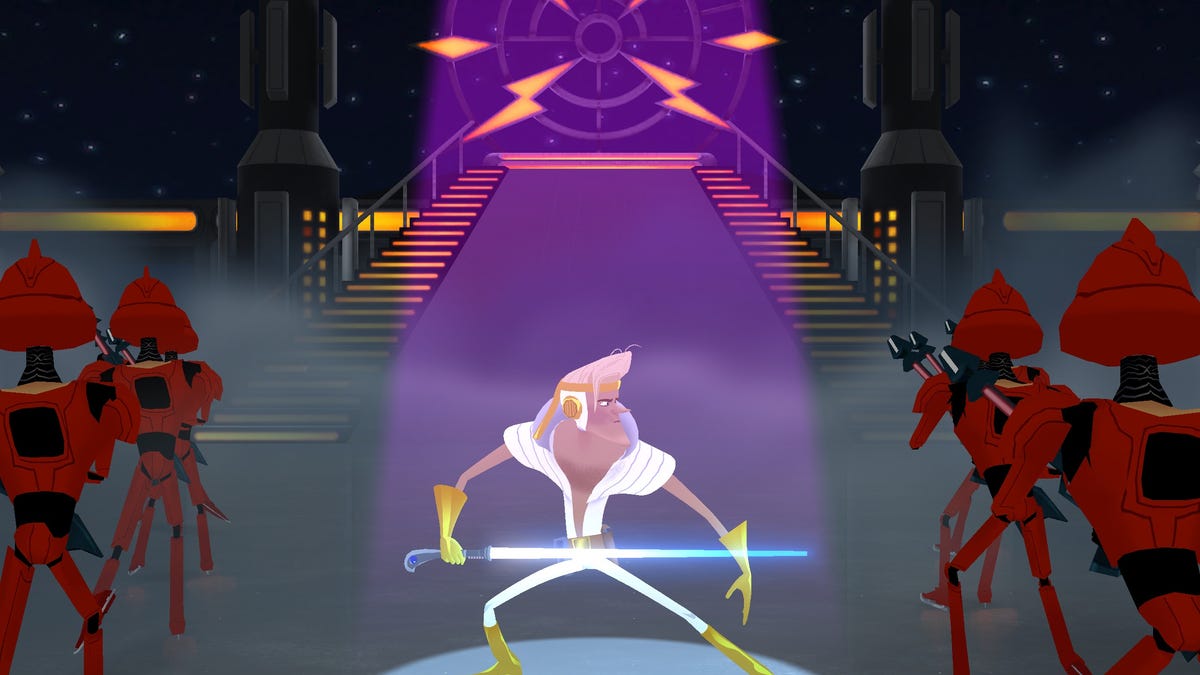Virtual reality isn't just for games; VR movies and TV shows are closer than you think
Commentary: The uniquely enthralling experience of VR means boundless creative potential for movies and TV.

I don't care how many cool points I lose by saying this: an animated short VR movie just blew my mind.
I hadn't seen anything like "On Ice" before, a "Blades-of-Glory"-meets-Pixar short created by Google, a veteran in VR animated movies by today's standards. The movie follows ice skater Rudy Lazarus as he spectacularly performs in an all-white, chest-hair-revealing, deep-V neck costume with flashy gold accessories, shiny headband included. It wasn't just Rudy's bold bravado and sick outfit that impressed me, it was the entire VR experience.
On Ice protagonist, Rudy Lazarus, is a sharp dresser.
As corny as it sounds, going from movies (as we know them) to virtual reality movies is like going from black and white to Technicolor. One of the best things about movies and TV shows are their ability to transport you to different places and times, and with VR, that effect is even stronger. It engages the audience in a different way; you can't see the whole scene at once, you have to move your head around, and one viewing may not be enough for you to see all there is to see.
You can't experience anything like this anywhere else, unless you're actually living it.
There's no denying that virtual reality is all the rage these days. Samsung's giving away Gear VR headsets like hotel mints. Gamers are up in arms about paying top dollar for a cutting-edge gaming console (as if state-of-the-art tech is ever cheap). Even the porn industry is breaking new ground on how to, er, entertain the masses using the creative potential of this "new" technology.
Samsung is giving away Gear VR headsets like hotel mints.
Most VR content today revolves around the gaming industry, and I don't play video games, so, understandably, I don't really give a crap about VR. Sitting down for hours pretending to shoot people, fight aliens or race cars sounds like a nightmare to me. I'd rather sit down for hours and binge-watch HBO original dramas or any (all) puppy videos on YouTube. Now that I've experienced how VR can entertain me as a TV-loving non-gamer, I can't wait to give a crap about it.
This visceral experience is an exciting frontier for movies and TV, the composition of which are usually limited to a scene at a time orchestrated by the director and stitched together by editors. Now, a director's vision can include a background character whose reaction is triggered when you turn to look at them, or an editor can add music that fades out when you're not facing the main character and fades back in when you are. Storytellers are no longer limited to the constraints of film and stories can come to life in a new, immersive, high-tech way.
At this time, VR movies and TV shows exist, there just aren't many, and some are only available on certain systems. Another dilemma is that the concept is so new, the possibilities so vast, it's hard to say what a VR movie or TV series should consist of, and to that end, how to even make one. Google's working on a set of tools for aspiring VR movie-makers and releasing it in beta later this year, but even with the help, it's like the Wild West out there.
Consumer demand, as usual, will play a big part in whether VR is a fad or a legitimate new genre of entertainment. I have no idea if it will take off, but similar to podcasts, if the content is good, the potential to succeed is great.
Though I barely stomached the 3 minute, 30 second film (I get nauseous easily) and sneered at the pixelated Google Cardboard screen like a true spoiled millennial, a hopeful spark of joy lights inside me when I think of the cool ways VR could be used by smart, visually creative people to construct new worlds where anything is possible. It's a rare, but familiar feeling; I felt the same way when I first used the Internet.

